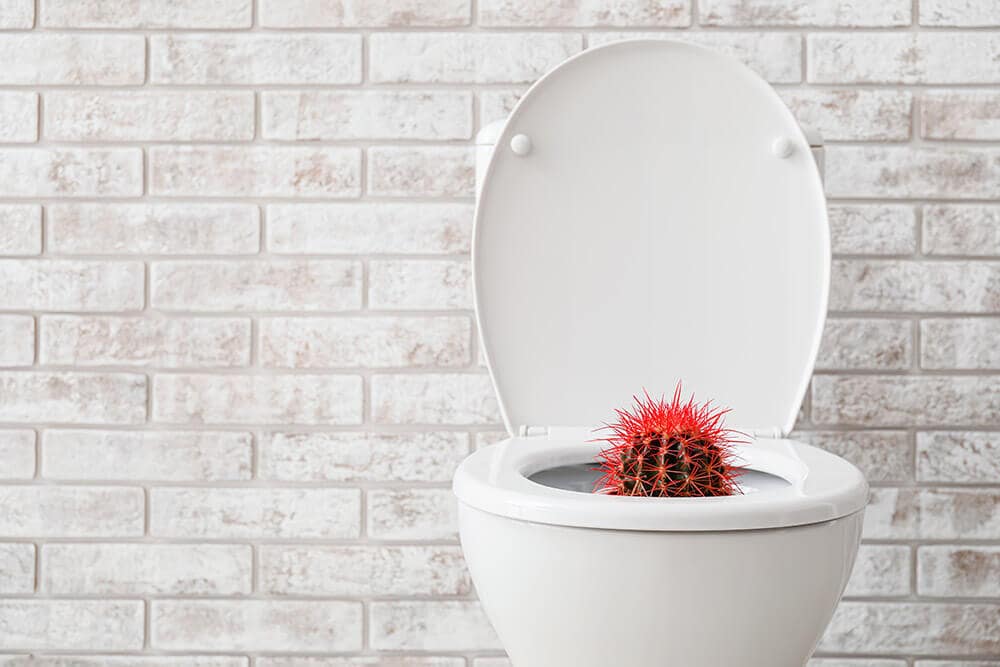
Rectal bleeding can be scary. It is problematic when the bowel is followed by the presence of blood. Is it serious? Should you worry? Certainly we shall find certain answers at Gastrodoxs. This post will also make you know how you are going to bleed, what you are going to see, and when you are going to see your specialist in Houston. Professional tips of Dr. Bharat Pothuri and convenient tips which can be trusted on will be included.
Rectal blood loss is either mild or acute. A trace of blood in your stool must be felt. Here's why:
Dr. Bharat Pothuri says so, adoption, Don't ignore it-get it checked.
We shall establish the most universal causes of blood in your stool. We are going to answer long-ground questions and explain every reason.
Hemorrhoids are bulky veins of the anus or sources. They are able to cause itchiness, pangs or blood of bright red color on toilet papers.
In his case, the specialist, Dr. Pothuri, stated that bleeding measures 25 cm -2 internal hemorrhoid, but is painless, at least in the vast majority of the cases. Those that are outside, scratch and sting.
Anal fissures Of the anal are small fissures of the lining of the anus. The emission of rigid stool normally leads to their occurrence.
These tears heal fast with the right care, says Dr. Pothuri.
Is there an ulcer, which causes rectal bleeding? Yes. An ulcer is a hole in the digestive system. Lower colon ulcers or rectal ulcers may be bleeding.
The inflammatory bowel diseases (IBD) such as ulcerative colitis or Crohn disease also cause bleeding. Look for:
Diverticula is in the form of small protrusions, which occur on the colon wall. Bright or dark blood can be found in case of bleeding pouch. The symptoms tend to be spontaneous.
On the lining of the colon, a number of growths is referred to as polyps. Some polyps bleed. Omitting their treatment, they may turn cancerous. Periodic colonoscopy is used to detect and remove polyps in their early stages.
Is being caused by stress which causes rectal bleeding? Even though stress does not physically slice the tissue in question it can worsen such ailments as hemorrhoids or IBS. Too much stress could change the nature of your bowel motions to lead to constipation or diarrhea -and that will finally come back to bleed you.
The presence of blood in stool is distorted. Here's what to look for:
What does blood in stool mean? It implies previous contamination of blood with stool. These symptoms should not be neglected 2 units.
It can dishearten you when you come across clot like material in your stool. Clots may have either a form of dark reddish maroon lumps. These are prone to indicate prolonged bloodshed. Common causes include:
You are to appoint a medical check up just in case of clots.
Most of the rectal blood loss is not a medical emergency. Nevertheless, in the signs of early attention:
GastroDoxs possess the best professionals in Houston who would gladly serve. This is what Dr. Pothuri advises against, they should not wait till bleeding deteriorates. The earlier the analysis, the better.
Physical examination and questions will compose the start of your doctor. Here's a typical process:
The causation is the determinant of the management. Here are common approaches:
| Cause | Color of Blood | Pain Level | Key Symptom | Treatment Basics |
| Hemorrhoids | Bright red | Mild to none | Itching, soreness | Creams, high-fiber diet |
| Anal Fissure | Bright red | Sharp pain | Tear sensation | Sitz baths, ointments |
| Ulcer / IBD | Dark red/maroon | Cramping | Diarrhea, weight loss | Meds, change of diet |
| Diverticular Bleeding | Bright or dark | No or often none | Acute heavy bleeding | Surgery, colonoscopy |
| Polyps / Cancer | Variable | No often | Family history | Screening, removal |
Small changes often help. Try these tips:
We also work with major gastroenterologists in GastroDoxs Houston. At home with our pleasant membership- whatever persists disturbing you. We offer:
Owing to the case being so simple and straight forward in its nature, Dr. Bharat Pothuri, declares it our mission to find problems out in the first place and to treat them with as little damage as possible.
For more details, visit:
Rectal bleeding can also be a symptom of many diseases - a modest clergymen fistula or a complicated disease. Being informed on the reasons and the early symptoms, you are able to contain your health. Board members are Gastrodoxs and Dr. Bharat Pothuri in case you are a resident in Houston. Neglect not the blood in bowel. Call 2day to get professional evaluation and personal therapy.
Remember, the sooner the better. Keep fit, keep informed, and carry on depending on Gastrodoxs to make you delivered thought and good-natured service.
Blood is usually bright red; consequently, due to hemorrhoid or anal fissure.
Stress condition can worsen bowel disorders (e.g., IBS), which, in its turn, may lead to bleeding.
It is normal of small blood stains on toilet paper. Seek medical advice in case the hemorrhage is excessive.
Yes an ulcer of the lower digestive tract or colon had the potential to bleed.
It displays a bleeding in the digestive tract. See a doctor to find the cause.
The fact that it has blood clots suggests more severe bleeding, as a consequence of massive hemorrhoids or diverticula.
Pain varies. Fissures no cause such bleeding, Hemorrhoids no pain itching.
Individual, physical, stool, and endoscopy (colonoscopy).
A high-federal diet and adequate fluids can lead to reduced strain and bleeding.
This is recommended when you experience dizziness, faintness, or if your bleeding cools off more than two pads within a span of 24 hours because of which you are advised to administer emergency care.